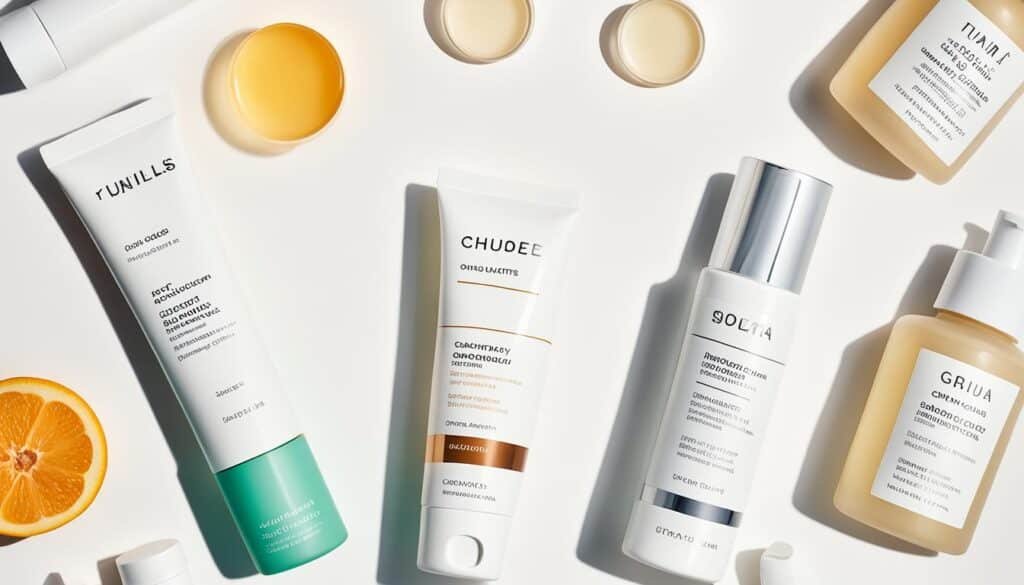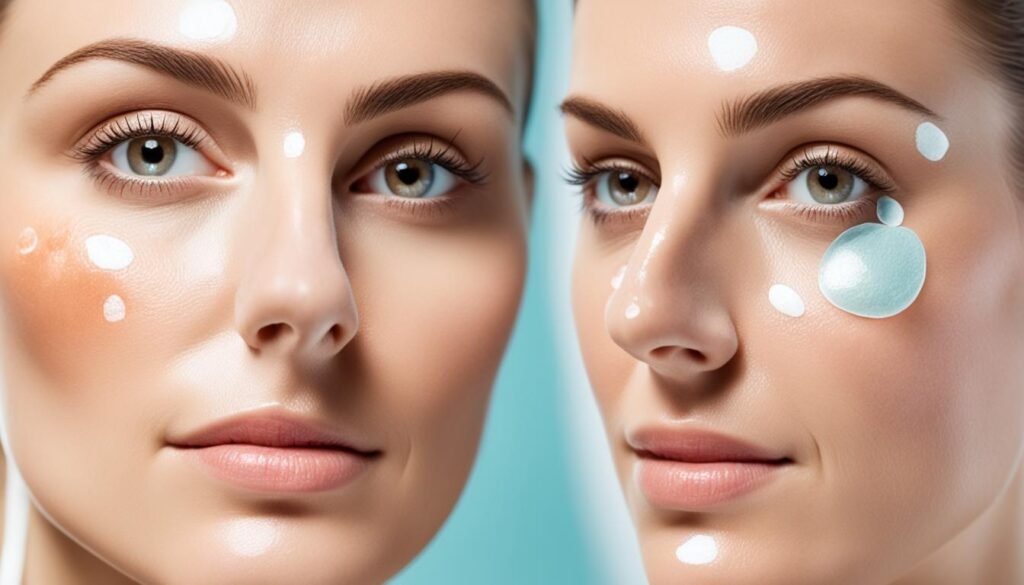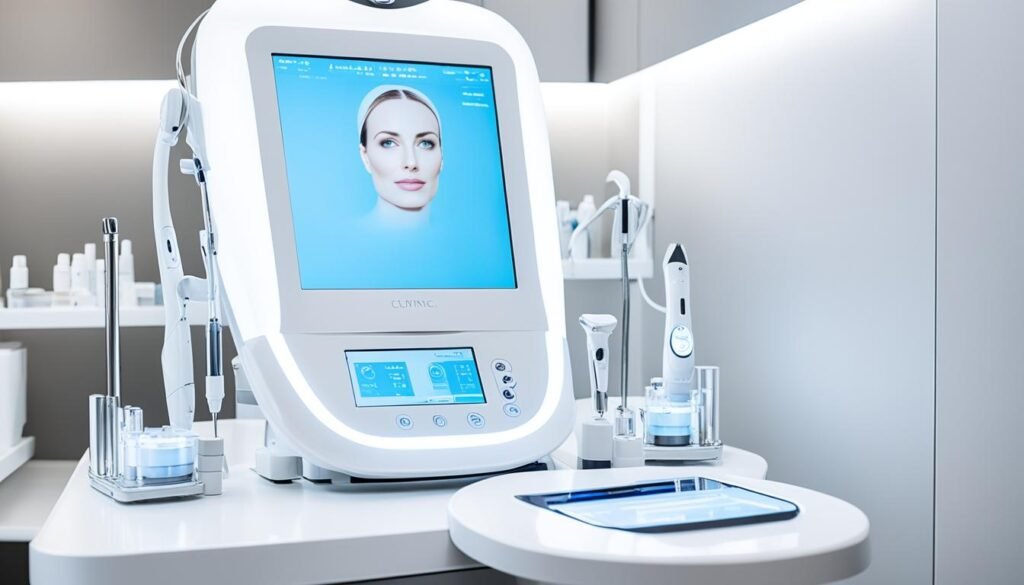Dark spots, or hyperpigmentation, can change how our skin looks. They appear often because of too much melanin, the skin’s color-giving substance. Causes can be sun damage, acne, aging, or changes in hormones. Darker skin types are more at risk for this.
These spots look flat, round, or oval and are mainly where the skin sees a lot of sun. Luckily, there are ways to deal with them. Skincare can lessen these spots and bring back a smoother, radiant look to the skin.
Key Takeaways
- Dark spots, or hyperpigmentation, are caused by excess melanin production in the skin, often triggered by sun exposure, acne, aging, and hormonal changes.
- People with darker skin tones are more prone to developing dark spots due to their higher levels of melanin.
- Effective skincare for dark spots should include regular exfoliation, the use of brightening ingredients like vitamin C and niacinamide, and consistent sun protection.
- In addition to at-home care, professional treatments such as chemical peels and laser treatments can also help address stubborn dark spots.
- Maintaining the results of fading dark spots requires diligent sun protection and an ongoing skincare regimen that targets pigmentation.
Identifying and Preventing Dark Spots
People with dark skin colors are more likely to get dark spots. This includes those with African, Asian, Latino, Mediterranean, Middle Eastern, and Native American backgrounds. Dark spots occur when the skin makes too much melanin. Melanin is the pigment that colors our skin.
Skin Types Prone to Dark Spots
Darker skin has more melanin. This makes it easier for dark spots to show up. Things like sun and other triggers can increase melanin, causing uneven skin.
Factors Causing Dark Spots
Many things can lead to dark spots. Too much sun, hormonal changes like in pregnancy or with birth control, inflammation from acne or injury, and some medications all play a part. Sun is a big cause because its UV radiation prompts more melanin. This results in those visible dark marks on the skin.
Essential Steps for Treating Dark Spots

To get rid of dark spots, you first need to understand why they show up. A good skincare plan should focus on a few key steps. Each step works on a different part of the problem.
Exfoliation
Getting rid of the top layer of dead skin is key to treating dark spots. Using products with alpha-hydroxy acids (AHAs), like glycolic acid or lactic acid, is great for this. These products can make your skin look brighter and more even.
Antioxidants
Using products rich in antioxidants can stop dark spots from getting worse. Antioxidants like vitamin C, ferulic acid, and niacinamide fight off damage from free radicals. They can also help keep new dark spots from appearing.
Sun Protection
Protecting your skin from the sun is vital. Using an SPF 30 or higher sunscreen every day, even when it’s cloudy, is a must. This protects your skin from the sun’s harmful UV rays. It also helps your skin heal from existing dark spots.
Selecting the Right Skincare for Dark Spots

Picking the right skincare products is key for dark spots and uneven skin tone. It’s best to choose gentle formulas with important ingredients. These help fade discoloration without making your skin more irritated.
Gentle Exfoliants
Choosing gentle chemical exfoliants is important. Alpha-hydroxy acids (AHAs) like glycolic acid or lactic acid are great choices. They remove dead skin gently, improving texture and reducing the look of dark spots and discoloration.
Brightening Ingredients
If you want to lessen hyperpigmentation and sun damage, pick products with strong brightening ingredients. Consider vitamin C, kojic acid, niacinamide, and retinol. With these, you can balance uneven skin tone and discoloration. Avoid products with harsh hydroquinone-free as these might irritate sensitive skin.
| Gentle Exfoliants | Brightening Ingredients |
|---|---|
|
|
Hydroquinone-free formulas are recommended, as hydroquinone can be harsh on sensitive skin and may cause irritation.
Addressing Dark Spots with Skincare Routines

A good skincare routine for dark spots needs a few key things. This includes exfoliation and using products rich in antioxidants. It also means always protecting your skin from the sun. Chemical exfoliants with alpha-hydroxy acids can brighten your skin by removing dead cells. They can also improve your skin’s look. Using vitamin C, retinol, and products with no hydroquinone can help reduce dark spots.
Sun protection is a must every day to stop new spots and let old ones fade. By making these steps part of your routine, you can fight hyperpigmentation. This will help make your skin look even-toned and glowing.
Skincare For Dark Spots

Dealing with dark spots and uneven skin tone needs patience and consistency. Results may not appear for weeks or months. It’s important to stick with a focused skincare plan. This is key to seeing the changes you want.
The Importance of Patience
Lightening dark spots takes time so having patience is crucial. While quick solutions might seem nice, effective skin care is slow. Using regular brightening ingredients like vitamin C and retinol, plus exfoliation and sun protection, helps. They are vital for reducing hyperpigmentation’s visibility.
Consistency is Key
Successful treatment of dark spots calls for consistency. It’s about sticking to the daily use of hydroquinone-free products. This approach mixes exfoliation, antioxidant-rich items, and consistent sun protection. Such a method works best for managing dark spots and making skin tone more even.
The Role of Professional Treatments

Using a good skincare routine at home is key for dealing with dark spots. But, if these spots don’t go away, you might need the help of experts. Professional treatments like chemical peels and laser sessions can really make a difference. They focus on and enhance the look of hyperpigmentation, uneven tones, and spots.
Chemical Peels
Chemical peels with alpha-hydroxy acids (AHAs) or beta-hydroxy acids (BHAs) can be a great pick. They help peeling off dead skin and reducing the look of spots, sun damage, and acne marks. By getting rid of the top layer, your skin underneath will be brighter and more even. Seeing a dermatologist is smart to pick the best peel for what your skin needs.
Laser Treatments
Laser treatments are another good choice for specific spots. Fractionated CO2 lasers or Q-switched lasers can target certain areas really well. They break up the extra melanin, making your skin look brighter and smoother. Lasers can also boost collagen, making your skin feel and look better overall. Your dermatologist can figure out which laser method is best for your skin’s certain problems.
Maintaining Results

To keep dark spots from coming back, it’s vital to stick to a good skincare routine. You must always protect your skin from the sun and use the right lotions and creams. This means keeping up with strong sun protection habits and using the right skincare products.
Sun Protection Habits
The best way to prevent dark spots is to wear a broad-spectrum SPF 30 or higher sunscreen every day. Sunlight prompts your skin to make more melanin, causing dark spots to appear. Consistent sunscreen use is crucial to keep your skin even and glowing.
Ongoing Skincare Regimen
Securing your skin’s health also calls for a daily skincare routine. Regular exfoliation removes old skin, while using antioxidant-rich creams like vitamin C and retinol help stop new spots from forming. And as always, don’t forget to put on sunscreen.
It’s essential to follow these steps daily. Doing so not only fades dark spots but also prevents new ones, maintaining your hard-earned progress.
Also Read: Gentle Protection: Best Sunscreen For Sensitive Skin
Conclusion
Getting rid of dark spots and getting even skin tone is a process. It needs proper skincare routine, regular sun protection, and sometimes, professional treatments. Daily, you should remove dead skin by exfoliating. Use products with antioxidants and brightening ingredients to stop melanin. Also, use sunscreen every day to stop new dark spots.
Patience and being consistent are key in fighting discoloration and hyperpigmentation. Using the right skincare products regularly can slowly improve how your skin looks. For harder to treat dark spots, consider chemical peels or laser treatments. They can make spots fade faster.
To keep dark spots from coming back, always protect your skin from the sun. Also, stick to a good skincare routine over the years. Doing these steps every day will keep your skin glowing and even for a long time.
FAQs
Q: What causes dark spots on the skin?
A: Dark spots on the skin are often caused by overproduction of melanin, which can be triggered by sun exposure, hormonal changes, inflammation, or skin injuries.
Q: How can I effectively treat skin discoloration?
A: To treat skin discoloration, you can use serums and moisturizers specifically formulated to target uneven skin tone. Look for products containing ingredients like vitamin C, retinol, niacinamide, and acids.
Q: Why is it important to use SPF in my skincare routine to prevent dark spots?
A: SPF helps protect the skin from harmful UV rays, which can worsen existing dark spots and trigger the formation of new ones. Using SPF 30 or higher daily is crucial in preventing skin discoloration.
Q: How do serums help in reducing dark spots and achieving clear skin?
A: Serums are potent formulations that can penetrate deep into the skin to target specific concerns like dark spots. Look for serums with brightening ingredients to help fade discoloration and achieve a more even-toned complexion.
Q: What role does moisturizer play in skincare for uneven skin?
A: Moisturizers help hydrate the skin, improve its barrier function, and prevent further damage. Choosing a moisturizer suitable for your skin type can help in maintaining a healthy and even skin tone.
Q: Can using a corrector help in addressing dullness and dark patches on the skin?
A: Correctors often contain color-correcting pigments that can help neutralize dark spots and dullness, giving the skin a more even appearance. Incorporating a corrector in your skincare routine can target specific areas of concern.
Q: How does skin renewal play a role in improving uneven skin tone?
A: Skin renewal involves the shedding of dead skin cells and the production of new ones, which can help in improving the appearance of uneven skin tone. Using products that promote cell turnover can enhance skin radiance and texture.




